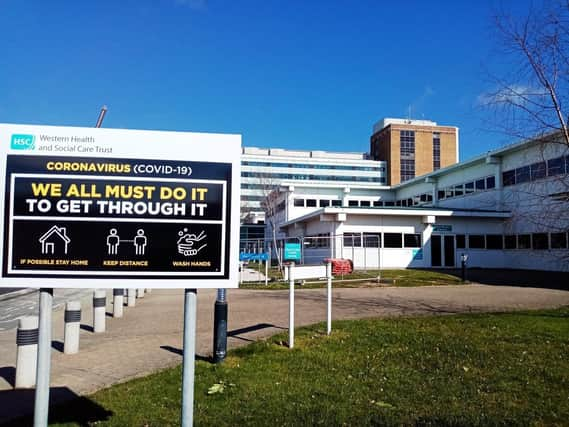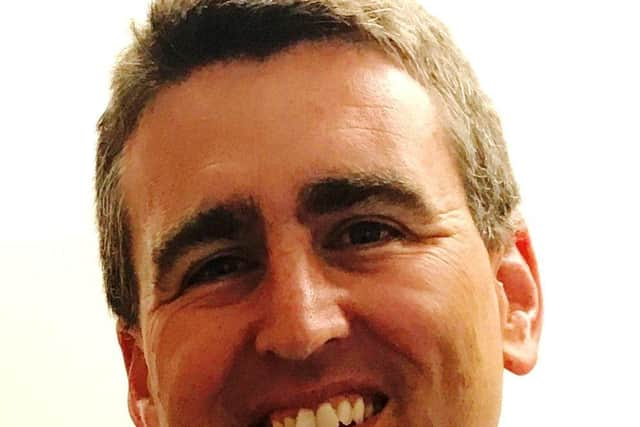Covid-19: Stay in and stay safe, says Derry GP


The COVID centres at Altnagelvin Hospital and South West Acute Hospital (Omagh) are up and running. The process is very smooth.
Patients are referred by their own GP and attend at a set time. The whole process is well organised but, undoubtedly, stressful for patients.
Advertisement
Hide AdAdvertisement
Hide AdMost patients go home again, but the whole process of putting on a mask, not being able to take a loved one with them and the uncertainty of this virus are frightening.


The vast majority of those with COVID 19 will have mild flu-like symptoms like a runny nose, stuffy nose or a cough. If it gets worse, it is generally after about a week and the cough becomes more severe with high temperatures and you feel short of breath and sore all over. Even at this stage, if rest and paracetamol help, that usually suffices.
Some people get very short of breath. Remember it’s how short of breath you are compared to your baseline. If you can run 10 miles every day and, all of sudden, you get breathless going up stairs, that’s a problem. People with chronic obstructive pulmonary disease (COPD) may find that, normally, they get breathless on the stairs but that, now, they are short of breath when at rest. If you are worried, ring NHS 111. They might direct you to your GP. They will assess you by phone or, possibly, video call.
Some people will be admitted for observation but the vast majority of patients will be reassured and sent home from the COVID centre. Every patient I have seen has been very anxious, as we all are; again, I think it’s worth remembering that the vast majority of patients improve. This includes the elderly. However, there does seem to be younger people affected quite badly or, even dying, and this makes us all a bit worried.
Advertisement
Hide AdAdvertisement
Hide AdWe have seen in Derry that social distancing and isolation have been very strictly adhered to and this has meant lower levels of illness and deaths. Our hospital ICU departments are still full but the levels are manageable.
Several weeks ago, people got very anxious because I made comments about difficult decisions being made about, among other things, who gets a hospital bed and who doesn’t - the type of issues we don’t usually have to deal with; hard, almost impossible, ethical decisions.
Thankfully, this stirred up enough fear that people did exactly what we all asked them to: stay in. If you stay in and don’t mix with others, it is impossible to get this. That’s why all those with severe illnesses have been asked to do so.
Work is ongoing to develop a vaccine and antiviral drugs. However, drug trials take time even when it’s an emergency.
Advertisement
Hide AdAdvertisement
Hide AdThe longer and better we maintain social isolation, then the lower the level of the virus becomes in the community.
There will continue to be pockets of this and, if levels fall and testing improves, we can quickly respond to and isolate these pockets. Unfortunately, we are not in that position yet. Testing is nowhere near as fluid and contact tracing isn’t routine.
Again, we must emphasise that all the things you might be almost taking as a matter of fact now - good hand hygiene, maintaining social distancing and only going out if really needed - are the most important things. They are much more important than ventilators and doctors and Personal Protective Equipment (PPE).
I’d love to go fishing but I won’t. If the sun shines, thank God it is shining but, please, remember to stay at home. Don’t be heading out in groups, don’t be going to the beach. There will be plenty of time to do this when this settles.
Advertisement
Hide AdAdvertisement
Hide AdIf you meet your friends, there’s a good chance you might spread the virus. It’s also possible there are people who are out are in the group who aren’t badly affected or aren’t affected at all - the asymptomatic carriers. The problem is, if they go back home and give it to their brother who has severe asthma or their mum who has COPD, they won’t be asymptomatic carriers. They might be the next death and you might have been the cause whether you realise it or not.
My mum and dad are over 70. They are well and, if they get this, will probably be OK. However, if I call to see them, which I’d love to do, and passed on anything - even though I’m fine - I’d find it hard to convince myself entirely that I was totally blameless.
If you can live with that, go for it; if not, stay in, keep yourself safe and your family safe.
I hear a lot of criticism of the police in England and I must say I have been very impressed with our police and Gardaí. For example, if they stop you for going to your holiday home, it’s with good reason. You are putting both yourself and them at risk, not to mention the people where you are going. That’s called being selfish.
Advertisement
Hide AdAdvertisement
Hide AdThankfully, I have not seen this behaviour in Derry. I have actually been very, very impressed by the response of the people here and must congratulate them on their steadfastness and kindness during this time.
I always hear people talking about the old days, how it used to be, people sharing, helping each other and that it must be ‘in the DNA’. Well, it must be true because that’s all I have seen lately.
Paul Molloy is a GP at the Clarendon Medical Practice in Derry.